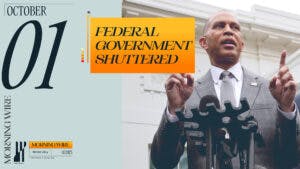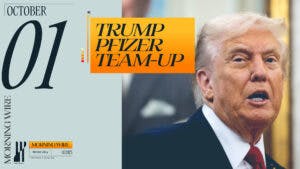The government has shut down, President Donald Trump has inked a historic deal with Pfizer, and Hamas has been given a deadline to agree with Trump’s Gaza peace deal.
It’s Wednesday, October 1, 2025, and this is the news you need to know to start your day.
Morning Wire is available on video! You can watch today’s episode here:
If you would rather listen to your news, today’s edition of the Morning Wire podcast can be heard below:
Budget Battle And Trump’s Speech To Military Brass
Topline: A busy day for lawmakers on Tuesday as the time ticked away for a government shutdown – while President Trump and Secretary of War Pete Hegseth held an unprecedented event attended by the U.S. military’s top commanders.
Washington’s shutdown showdown: Lawmakers haggled until the last moment on funding for the federal government, but were unsuccessful. About a day ahead of the deadline, The New York Times and Siena College released a poll that had some worrying signs for Democrats. According to the poll, two-thirds of Americans say that Democrats should not force a government shutdown.
Senate Minority Leader Chuck Schumer (D-NY) later called the poll “biased,” drawing a laugh from assembled senators.
President Trump attempted to bring Democrats to the table on Tuesday by reminding them that during a shutdown, he has considerable authority to reshape the government. “The last person who wants it shut down is us. Now, with that being said, we can do things during the shutdown that are irreversible, that are bad for them and irreversible by them, like cutting vast numbers of people out and cutting programs that they like,” said Trump.
Schumer interpreted the threat as Trump owning the shutdown: “Democrats do not want a shutdown. We stand ready to work with Republicans to find a bipartisan compromise. The ball is in their court. When he says he will do things, he is taking ownership.”
Over in Quantico: Trump and Hegseth delivered two speeches to essentially every top commander in the U.S. military. The speeches lasted approximately two and a half hours.
The War Secretary reiterated the priorities he has often pushed as the head of the military: cutting social engineering and restoring what he calls the warrior ethos.
“No more identity months. DEI offices, dudes in dresses. No more climate change worship. No more division, distraction, or gender delusions. No more debris, as I’ve said before, and we’ll say again. We are done with that s***,” said Hegseth.
To build the military into what he said it should be, Hegseth offered a test to each military leader: Would you allow your own child to serve in the military as it’s currently structured? Unless the answer is an unqualified yes, then there are more changes to be made.
“This means at the War Department, first and foremost, we must restore a ruthless, dispassionate, and common-sense application of standards,” said Hegseth. “I don’t want my son serving alongside troops who are outta shape or in combat unit with females who can’t meet the same combat arms, physical standards as men.”
Trump: The president’s speech was more like a military-focused campaign speech. He touted how, under his administration, the military has crushed recruitment goals and how the United States is leading China and Russia in military advances.
“My message to you is very simple. I am with you. I support you. And as president, I have your backs 100%. You’ll never see me waver even a little bit. That’s the way it is,” Trump told assembled commanders.
TrumpRX: The One-Stop-Shop For Cheap Drugs
Topline: President Trump has promised a new era of lower drug prices for Americans with the launch of TrumpRX and a historic deal with Pfizer.
TrumpRX is going to be a new government website that will allow Americans to purchase medications directly at discounted prices. The site will feature reductions of up to 85% of the net price.
Pfizer: Pfizer is one of the largest pharmaceutical and biotechnology corporations in the world. It has agreed to set all their medications for Medicaid at “most favored nation” pricing, or pricing that is comparable to or less than the cost of other developed nations’ drug prices. Additionally, all new Pfizer medications will be offered at these lower prices.
Pfizer will also invest $70 billion in research and development, as well as United States manufacturing, by 2030. Trump has long said that he wants drugs made in the United States to bring back jobs, but also for national security.
More to come?: Trump indicated on Monday that more deals are coming, and he is offering incentives to boost that participation. However, if a company refuses to comply, he said he will use tariffs and other mechanisms to obtain lower drug prices for Americans.
“Eli Lilly has been fantastic,” said Trump. “We’re making deals with all of them. And I said if we don’t make a deal, then we’re going to tariff them an extra five, six, seven, eight percent. … Nobody wants to play that game.”
Step back: Americans pay, on average, about 422% more for brand-name drugs than other comparable nations. Trump said months ago that this is a form of “global freeloading,” where Americans underwrite all research and development costs that turn out most medical advances that benefit the world. He launched these “most favored nation” policies so R&D costs are distributed to other developed nations, as well – nations like France, Germany, and the U.K.
The goal is that this will lower drug prices for Americans, while these companies maintain their margins, and therefore, R&D funding and medical advances do not suffer.
Trump Puts Hamas On The Clock
Topline: President Trump presented what could be a game-changing Gaza peace deal this week, which has won support from Israel as well as many Arab leaders. Now, Trump has given Hamas a deadline to get on board or face a “very sad end.”
Expert opines: Victoria Coates, the vice president of The Heritage Foundation’s Kathryn and Shelby Cullom Davis Institute for National Security and Foreign Policy, on the president’s 20-point plan for peace in the Middle East: “The key clause is probably the first one, which says that Hamas has to disarm and agree to this plan. But unlike the ‘Peace to Prosperity Plan’ that the president unveiled with Prime Minister Netanyahu in January of 2020, this one is being overtly and aggressively supported by partners in the Middle East. We have countries like Saudi Arabia, Jordan, Egypt, UAE, but also large Muslim majority countries like Pakistan, Indonesia, putting out statements saying, ‘yes, this is the way, this is the plan, this is a good faith effort.’ And so it all comes down to Hamas. Israel has accepted, the rest of the region has accepted, and the question is whether Hamas will accept.”
Coates on the Palestinian Authority’s stance on the plan: “[Palestinian Authority President Mahmoud Abbas] came out and said he was happy that this had happened, that he wanted to look at it, but that he thought it was a productive step. That is 180 degrees from where he was five years ago. … There is very strong reforms for the Palestinian Authority in there that they have to undertake before they get any kind of governing responsibility in Gaza. So, they’re going to have a lot of work in front of them, as well. And for him to be hopeful about it suggests that, maybe more broadly among the Palestinian people, there is support for this kind of resolution.”
Coates on Hamas’ willingness to accept: “It all depends on what condition Hamas finds itself in today. If they are really down to their last fighters, if they are out of rockets … they may be looking for survival. This does give them that path. It says that if you wish to disarm and embrace a life of amnesty, that you can stay. And if you wish to leave, you will be given safe passage to third countries. They may see this as their last ticket out.”
Coates on how the deal will be enforced: “There are going to be benchmarks Hamas has to meet repeatedly throughout this process or else Israel goes right back in. The president expressed full-throated support for Israel’s right if Hamas does not keep their side of the bargain to do what they have to do to secure the strip. Now, that’s not going to be pretty. Prime Minister Netanyahu called it ‘the hard way.’ He said he would much rather do it the easy way. I think we all would – especially for the Palestinians living there – this is the way for them to get to a more secure and prosperous future. President Trump believes in that. He wants it to happen. And he’s the one who can lead the way there.”



